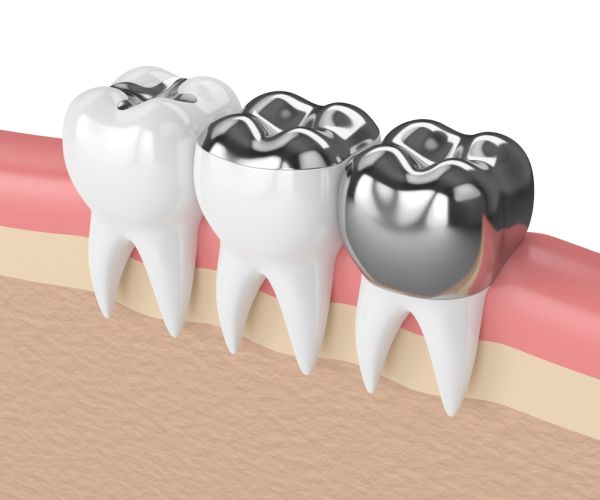6 Benefits of Implant Crowns?

As one of the more popular forms of tooth replacement, implant crowns have many advantages over other forms of treatment such as partial dentures or fixed bridges. It is helpful to be familiar with these benefits when determining whether implant crowns are right for you.
Implant crown advantages
Implant crowns are ideal for anyone who has one or several missing teeth and wants replacements that will last for decades, look great and preserve oral health. The following are six of the more notable benefits to choosing implant crowns to replace missing teeth.
1. Cosmetic appearance
Implant crowns look just about identical to natural teeth, and no one is likely to know the patient has replacement teeth unless they were to mention it. The shade of the crown matches the rest of the teeth, ensuring a natural appearance. This cosmetic advantage of implant crowns helps many in their daily life.
2. Increased confidence
The better someone looks, the more confident they are likely to be. Implant crowns often help patients achieve a smile they are truly proud of and enjoy showing off. The increased confidence leads many to become more social and pursue the things they love to do in life without fear of displaying their pearly whites.
3. Improved function
Some of the hardest adjustments to make after tooth loss occurs are in eating and speaking, which often become difficult. Many are forced to alter the way they eat, sticking primarily to soft foods that require little chewing. Fortunately, implant crowns allow patients to eat as they please and talk with clarity once again.
4. Preserving bone
Bone loss is inevitable once tooth loss occurs. Implant crowns work to preserve the health of the bone as the implant is placed into the jaw. A process called osseointegration takes place, which involves the jawbone and the implant fusing together, ensuring that bone deterioration does not take place. Dental implants are the only teeth replacement solution with this benefit.
5. Long-lasting solution
Implant crowns can typically last for decades before replacement or serious repair is required. Whereas dentures and fixed bridges may need repair more often, implant crowns can last for up to twenty-five years in many instances. Of course, proper care is essential to prolonging the life of implant crowns after placement.
6. Better oral health
Tooth loss often increases the risk of other oral health complications developing, such as oral infection, bone loss or gum recession. To preserve overall oral health, it is helpful to replace any missing teeth, and many cosmetic dentists consider implant crowns to be the most successful way to restore oral health back to an optimal level after tooth loss.
Talk to a cosmetic dentist about implant crowns
Many of our patients achieve a more attractive and healthy smile through implant crowns, and we would love to help you learn more. Our team can answer questions and provide detailed information on each step of the implant crowns placement process.
Request an appointment here: https://www.newyorkdentaloffice.com or call New York Dental Office at (212) 548-3261 for an appointment in our New York office.
Check out what others are saying about our services on Yelp: Read our Yelp reviews.
Recent Posts
Scheduling an initial visit to a dental practice marks the first step toward maintaining optimal oral health. Proper preparation for this appointment ensures a seamless experience, allowing the dental team to provide the highest-quality care possible. Understanding what documents and information to bring facilitates efficient care, reduces stress, and helps patients feel comfortable and informed…
Dental practices provide essential oral health services to patients of all ages. These services range from preventive and restorative treatments to cosmetic and emergency procedures. Understanding the types of care available at a general dental practice can help patients make informed decisions about their oral and overall health.Preventive care is a cornerstone of dental practice…
Regular visits to a dental practice provide essential care for achieving and maintaining optimal oral health throughout a patient’s lifetime. Beyond treating immediate dental concerns, a dental practice emphasizes preventive care, patient education, and tailored treatments designed to safeguard oral health for years to come. Understanding the role of professional dental care underscores the importance…
Endodontics is a branch of dentistry dedicated to saving teeth by treating problems inside the tooth. It focuses on the health of the tooth's pulp and roots, essential to your smile's overall strength and function. Endodontics could be the key to relieving discomfort and preserving your natural teeth if you are experiencing tooth pain or…



